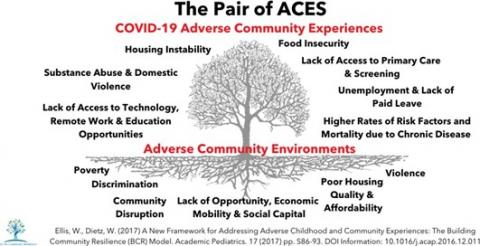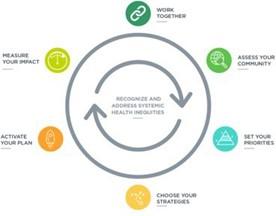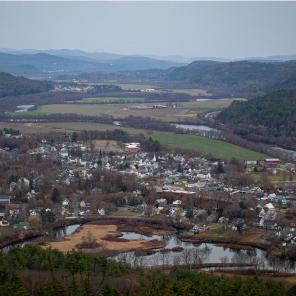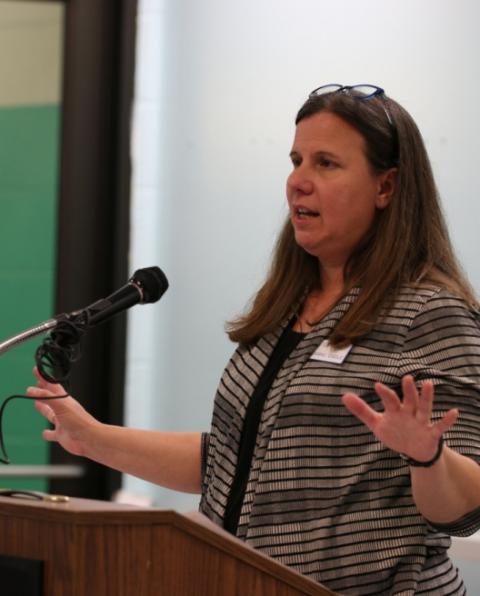The Building Community Resilience Toolkit is a resource that includes a step-by-step process to guide individuals and groups on how to create community change to improve the health of those who live, work, and play there. Within the toolkit you'll find real examples from NH communities who've used the process. Utilize included templates and tools to assist you in working together, looking at community data, prioritizing opportunities for action, action planning, and how to evaluate your work and tell your story. This toolkit was created as part of the FY 2020 Rural Health and Safety Education Competitive Grants Program of National Institute of Food and Agriculture, USDA Grants #2020-46100-32839.
UNH Cooperative Extension has received a two-year grant from the National Institute of Food and Agriculture
The UNH Extension-led project team provides technical assistance and facilitation to help communities identify where efforts can have the most impact. Local coordinators in each of the 3 communities will provide local leadership, “boots on the ground” support for the project and will help manage activities within the community.
- Melissa Lee, UNH Extension
- Sue Cagle, UNH Extension
- Kendra Lewis, UNH Extension
- Alyssa Lemmermann, UNH Extension
- Beth Gustafson Wheeler, Foundation for Healthy Communities
This work is supported through a Rural Health and Safety Education grant from USDA/NIFA. LEARN MORE
About the Effort
In the Fall of 2020, UNH Extension received a Rural Health and Safety Education Grant from USDA/NIFA. This grant supports efforts around building resilience in rural communities, focusing on three regions within Grafton and Merrimack counties: Kearsarge, Mascoma, and Haverhill Area. The UNH Extension project team will work to increase community collaboration in rural areas to address barriers to health and helping individuals and families thrive in light of challenges brought on by or deepened by COVID-19.
Throughout the duration of this project, Extension staff will work closely with local community partners to provide tools and resources to help these rural NH communities “bounce back” in the face of adversity and move forward to improve outcomes for children, families, and communities. This will be accomplished through assisting communities with:
- Identifying assets and challenges
- Identifying which priorities are most feasible to address
- Choosing relevant strategies and activating plan
- Providing education and skill building around adversity and building resilience
- Building connections across the 3 regions
The UNH Extension project team will be utilizing common frameworks within the 3 communities to help guide project activities.
"Like trees, in order for a community to thrive, there are necessary factors that contribute to the health and well-being of people who live, work, and play there,” Melissa Lee, project co-director and Youth and Family Resiliency Field Specialist for UNH Extension.
This model will be utilized to explore the relationship between Adverse Community Environments (“soil factors”) and Adverse Community Experiences.

The health of the soil in which a tree is planted determines the health of the tree. For example, a fruit tree may not bear fruit if the soil it is planted in does not include the nutrients it needs to grow and thrive.
Like trees, in order for a community to thrive, there are necessary factors that contribute to the health and well-being of people who live, work, and play there.
These factors in our community “soil” help people to be resilient to challenges and to thrive.
This model will be utilized to inspire action at all levels.
- Work Together
- Assess Your Community
- Set Your Priorities
- Choose Your Strategies
- Activate Your Plan
- Measure Your Impact

Figure 2 - This model is developed by Well Connected Communities
- “Resilient Communities.” George Washington University.
- “Community Change Cycle.” Well Connected Communities.
“Needs in the arena of personal, community and system health and well-being are immense, due to new and intensified adversities that act as barriers to health. We look forward to engaging in the community change cycle process, bringing together increased energy and ability to build community resilience to not only overcome but to thrive in the face of adversity.”
~Melissa Lee, project co-director and Youth and Family Resiliency Field Specialist for UNH Extension
How?
Each of the three regions will create their own unique action plan- led and identified by community members. Sustainable change requires community members to take the lead in identifying needs, setting priorities, and moving action forward to build thriving, resilient communities.
$10,000 is available for each community to implement an action plan and the UNH Extension project team will provide technical assistance and facilitation support to help communities identify where efforts can have the most impact.
Local coordinators in each of the 3 communities will provide local leadership and “boots on the ground” support for the project and will help manage activities within the community.
Haverhill Area
Joseph Mitchell
Student Assistance Program
Woodsville High School
Coordinator
Haverhill Area Community Resilience Project
Kearsarge Area
Mascoma Area
Field Specialist, Community & Economic Development
UNH Cooperative Extension
The Enterprise Center, #201
1 Bridge St.
Plymouth, NH 03264
603.347.8183








